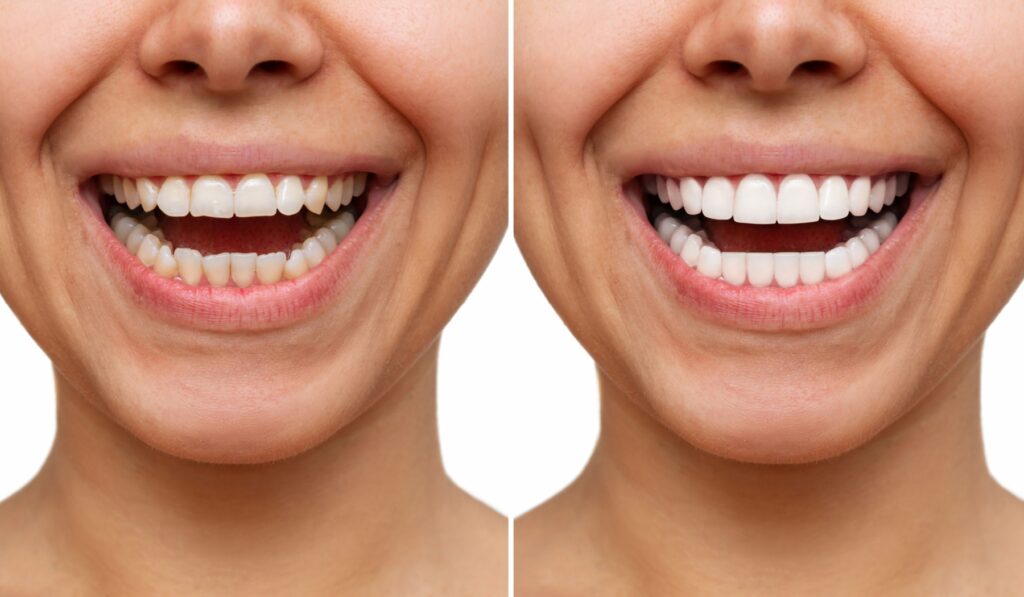A confident smile makes a lasting impression. For those looking to enhance the shape, colour, or alignment of their teeth, veneers offer a refined, long-lasting solution. These thin, custom-crafted shells are bonded to the front surface of the teeth to create a brighter, more symmetrical appearance.
Veneers come in 2 primary types, porcelain or composite, each designed to meet different aesthetic goals, timelines, and budgets. Understanding the types of veneers available and the process behind them is crucial for making an informed decision about your smile transformation.
What Are Veneers?
Veneers are ultra-thin porcelain or composite facings that are permanently bonded to the front of your teeth. They are specifically designed to address a range of aesthetic concerns, such as:
- Discoloured or stained teeth
- Chipped or cracked teeth
- Misshapen or worn teeth
- Gaps between teeth
- Slightly crooked or overlapping teeth
- Teeth that are naturally small or uneven
Because veneers are tailored to match the natural shade and contour of your existing teeth, the final result is a cohesive and natural-looking smile. Once applied, veneers become a permanent part of your dentition, offering a durable and polished appearance.
Types of Veneers
There are 2 primary categories of veneers, each suited to different needs and treatment goals:
Porcelain or Ceramic Veneers
Porcelain veneers are often considered the ideal choice for patients seeking a long-lasting solution. These veneers are crafted from quality dental ceramic and provide several advantages:
- Natural aesthetics: Mimic the light-reflecting qualities of natural enamel.
- Stain resistance: Non-porous surface helps resist common staining agents like coffee, tea, and red wine.
- Durability: Often lasts 10–15 years or longer with proper care.
- Custom design: Shaped to fit each tooth and match your overall smile.
Porcelain veneers are typically recommended for patients seeking a significant and lasting cosmetic improvement.
Composite or Plastic Veneers
Composite veneers are created using a tooth-coloured resin material. They are placed directly onto the tooth.
While they can be a helpful solution in some instances, they are generally considered a more temporary or transitional option for the following reasons:
- Shorter lifespan: More prone to staining, chipping, and general wear.
- Less durability: Typically lasts 5 years based on oral care and if there is any grinding activity.
- More affordable: May be suitable for interim use or specific cases requiring less permanence.
Your dentist will help you determine whether composite or porcelain veneers are most appropriate for your treatment goals.
How Veneers Are Applied
The veneer process is methodical and tailored to suit each patient’s oral health and aesthetic vision. Here is what the procedure typically involves:
- Consultation: A thorough dental exam is conducted to assess tooth integrity, alignment, and overall oral health. Your dentist will evaluate whether veneers are the right choice or if other treatments may be more suitable.
- Photographs and a 3D Scan: Photographs and a digital scan is taken to design veneers that precisely match your smile.
- Tooth preparation: A thin layer of enamel is typically removed from the front of the teeth to create space for the veneer and provide a natural-looking result. Once this is done, an impression is taken to send to the laboratory.
- Custom fabrication: Veneers are crafted in a dental laboratory using shade guides and models to ensure the best possible match. You will receive temporary plastic veneers until the permanent ones are ready.
- Bonding: Once ready, the veneers are bonded to your teeth using a high-strength dental cement. Final adjustments are made for a perfect fit and bite alignment.

Lifespan & Maintenance
With proper maintenance, veneers—particularly those made of porcelain—can last over a decade. However, several factors influence how long they remain in optimal condition:
- Oral hygiene: Daily brushing and flossing, along with routine dental visits.
- Diet: Avoid biting into hard substances (ice, bones, fingernails).
- Habits: Teeth grinding, clenching, or using teeth as tools can shorten their lifespan.
- Gum health: Gum recession over time can expose veneer margins.
- Tooth movement: Natural rotations or shifts may affect alignment; a night guard may be recommended.
Preventive care is essential for maintaining your veneers and protecting your investment in your smile.
When Should Veneers Be Replaced?
Although veneers are made to last, they do not last a lifetime. Over time, replacement may be necessary due to:
- Chips, cracks, or fractures
- Staining or discolouration of the underlying tooth
- Gum recession that exposes veneer edges
- Changes in tooth alignment or rotation
When a veneer needs to be replaced, it is possible to match it seamlessly to your existing veneers. If multiple replacements are required, the original process is repeated to restore the harmony and appearance of your smile.
Are You a Candidate for Veneers?
Veneers are not suitable for everyone. A dental evaluation can determine whether they are the best option based on:
- The condition and structure of your teeth
- The presence of discolouration, crowding, or old dental work
- Bite alignment and jaw function
- The presence of periodontal disease
In cases of significant misalignment or overcrowding, orthodontic treatment may be a more suitable option. However, veneers may still be a faster and more comprehensive solution when multiple cosmetic concerns —such as staining, asymmetry, and worn enamel—exist simultaneously.
Start Your Smile Transformation
Veneers provide a sophisticated way to enhance the appearance of your smile with precision and artistry. Whether you are seeking to refine a single tooth or reshape your entire smile, this cosmetic option can deliver lasting results that look natural and feel like your own.
Ready to take the next step? Contact our team at Cooper Dental to explore your options or schedule an appointment. We are here to guide you every step of the way—and to keep your smile shining bright.




